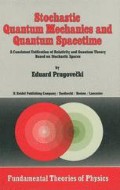Abstract
We have seen in the last chapter that when we take in nonrelativistic stochastic quantum mechanics the sharp-point limit in either position or momentum we do obtain well-defined limits for such basic measurable quantities as probability densities, currents, transition probabilities, etc., and in this manner recover conventional nonrelativistic quantum theory. The existence of such limits demonstrates that the textbook idealizations that tacitly postulate perfectly exact position or momentum measurements are theoretically compatible with the other basic tenets of nonrelativistic quantum mechanics (canonical commutation relations, Schrödinger and Heisenberg equations of motion, etc.), but it does not establish the fundamental ontological validity of such a postulate. Clearly, we are dealing here with the question as to whether space is infinitely divisible or not, and as to whether there actually are particles that are pointlike in a literal sense rather than as approximations of physical reality. The fact that we can imagine in our minds the division of space into smaller and smaller partitions by means of lines, planes and other idealized geometrical objects might constitute sufficient proof of this infinite divisibility within the context of Plato’s and subsequent schools of philosophic idealism, but it cannot be taken as relevant in the context of any empirically based philosophy that underlies scientific epistemology. As strongly emphasized by Heisenberg (1976), all indications are that when carried out in operational, empirically based terms, any sequence of increasingly finer subdivisions of space or time might reach the stage where any further subdivision loses all meaning.
“I believe that certain erroneous developments in particle theory … are caused by the misconception by some physicists that it is possible to avoid philosophical arguments altogether. Starting with poor philosophy, they pose the wrong questions. It is only a slight exaggeration to say that good physics has at times been spoiled by poor philosophy.” Heisenberg (1976, p. 32)
“The whole problem of relativistic quantum mechanics, which has been holding the development of theoretical physics for decades, reduces to finding suitable sets of ten operators satisfying the commutation relations [for the Lie algebra of the Poincaré group].” Dirac (1978b, p. 6)
Access this chapter
Tax calculation will be finalised at checkout
Purchases are for personal use only
Preview
Unable to display preview. Download preview PDF.
Author information
Authors and Affiliations
Rights and permissions
Copyright information
© 1984 D. Reidel Publishing Company, Dordrecht, Holland
About this chapter
Cite this chapter
Prugovečki, E. (1984). Relativistic Stochastic Quantum Mechanics. In: Stochastic Quantum Mechanics and Quantum Spacetime. Fundamental Theories of Physics, vol 4. Springer, Dordrecht. https://doi.org/10.1007/978-94-009-4492-3_2
Download citation
DOI: https://doi.org/10.1007/978-94-009-4492-3_2
Publisher Name: Springer, Dordrecht
Print ISBN: 978-94-010-8501-4
Online ISBN: 978-94-009-4492-3
eBook Packages: Springer Book Archive

